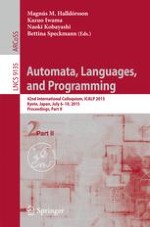2015 | OriginalPaper | Buchkapitel
Polylogarithmic-Time Leader Election in Population Protocols
verfasst von : Dan Alistarh, Rati Gelashvili
Erschienen in: Automata, Languages, and Programming
Verlag: Springer Berlin Heidelberg
Aktivieren Sie unsere intelligente Suche, um passende Fachinhalte oder Patente zu finden.
Wählen Sie Textabschnitte aus um mit Künstlicher Intelligenz passenden Patente zu finden. powered by
Markieren Sie Textabschnitte, um KI-gestützt weitere passende Inhalte zu finden. powered by
Population protocols are networks of finite-state agents, interacting randomly, and updating their states using simple rules. Despite their extreme simplicity, these systems have been shown to cooperatively perform complex computational tasks, such as simulating register machines to compute standard arithmetic functions. The election of a unique
leader agent
is a key requirement in such computational constructions. Yet, the fastest currently known population protocol for electing a leader only has
linear
convergence time, and it has recently been shown that no population protocol using a
constant
number of states per node may overcome this linear bound.
In this paper, we give the first population protocol for leader election with
polylogarithmic
convergence time, using polylogarithmic memory states per node. The protocol structure is quite simple: each node has an associated value, and is either a
leader
(still in contention) or a
minion
(following some leader). A leader keeps incrementing its value and “defeats” other leaders in one-to-one interactions, and will drop from contention and become a minion if it meets a leader with higher value. Importantly, a leader also drops out if it meets a
minion
with higher absolute value. While these rules are quite simple, the proof that this algorithm achieves polylogarithmic convergence time is non-trivial. In particular, the argument combines careful use of concentration inequalities with anti-concentration bounds, showing that the leaders’ values become spread apart as the execution progresses, which in turn implies that straggling leaders get quickly eliminated. We complement our analysis with empirical results, showing that our protocol converges extremely fast, even for large network sizes.
